Merk White Papers provide in-depth information into currencies as an asset class.
| |
 |
New! Active Currency Management in Portfolio Construction
“Central banks have compressed risk premia, demanding increased risk management of portfolio managers to steer portfolios through what may be more volatile times ahead. High asset valuations, growing geopolitical risks and the effects of distressed commodities markets are just a few of the current concerns that investors have. A multi-year bull market run in equities has raised return expectations for portfolio managers, who run the risk of losing diversification by chasing higher yielding assets, as alternative asset classes that offer attractive returns may be too correlated with stocks and bonds. Despite their potential portfolio enhancing benefits, currencies as potential alternative are thereby often overlooked.
This White Paper makes the case for currency strategies and primarily intends to bring more attention to the value proposition of actively managed currencies in the portfolio design context. We present arguments why investors should consider currencies in asset allocation decisions, how we differentiate active currency management from passive, and provide economic intuition why the often misunderstood microstructure of the foreign exchange market offers alpha opportunities...." |
|
|
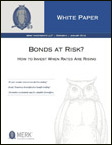 |
Bonds At Risk? How To Invest When Rates Are Rising
“How should one invest in a rising rate environment? Our analysis suggests that in addition to active risk management within a fixed income allocation, building a more diversified portfolio with the inclusion of alternative assets, including currencies, may provide investors with an improved risk-return trade-off heading into a period of rising interest rates..." |
|
|
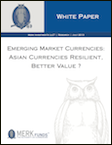 |
Emerging Market Currencies: Asian Currencies Resilient, Better Value?
“Year-to-date through June 2013, we have experienced unusually high volatility in emerging market currencies, stemming from the speculation around the Federal Reserve Board’s tapering, spillover of the Bank of Japan’s recent easing, geopolitical instability, and slower growth in major emerging market economies. To protect them- selves, should U.S.-based investors abandon their emerging market currency exposures? Are there any emerging market currencies that might weather the storm better than others?..." |
|
|
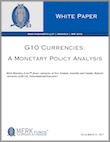 |
G10 Currencies: A Monetary Policy Analysis
“We present a methodology by which currencies can be systematically ranked based on economic fundamentals and policy choices. The Merk Monetary Score currently favors currencies of New Zealand, Australia and Canada..." |
|
|
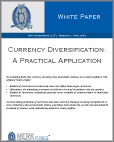 |
Currency Diversification: A Practical Application
“Currency investing may potentially enhance an overall portfolio's risk adjusted return profile:
- Currencies typically exhibit low correlation to one another, as well as to other asset classes
- Baskets of currencies provide more diversification than single currencies
- Baskets of currencies consistently generate lower volatility of returns than single currencies
- Investing in baskets of currencies may provide optimal risk-adjusted returns
|
|
|
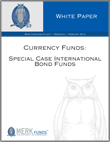
|
Currency Funds - Special Case International Bond Funds
“Currency funds may be considered special cases of international bond funds, as many of them invest in international fixed income securities of short duration to gain currency exposure. Reducing the duration of international fixed income investments may significantly reduce a portfolio's risk profile. Therefore, such currency funds may be worth considering as a tool to actively address interest and credit risk in a diversified portfolio...” |
|
|
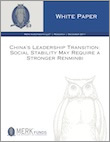
|
China's Leadership Transition - Social Stability May Require a Stronger Renminbi
“In 2012, China is poised to undergo a significant change in the official leadership structure of its country. Given that China maintains centralized government control over much of the country, even a marginal change in leadership composition may have deep and far reaching implications for the economy and investors globally. This report is aimed at analyzing the key implications from a global investor’s standpoint...” |
|
|
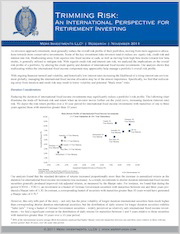 |
Trimming Risk - An International Perspective on Retirement Investing
"As investors approach retirement, most generally reduce the overall risk profile of their portfolios, moving from more aggressive allocations towards more conservative investments. Some of the key investment risks investors tend to reduce are: equity risk, credit risk and interest rate risk. Reallocating away from equities into fixed income or cash, as well as moving from high beta stocks towards low beta stocks, is generally utilized to mitigate risk. How can currency funds help to potentially reduce the interest and credit risk in a portfolio..." |
|
|
 |
How Can Investors Protect Against U.S. Dollar Risk?
"Investors may want to consider diversifying away from U.S. dollar denominated assets and managing the U.S. dollar risk inherent in their portfolios. The White Paper analyzes the different currency risk diversification and management options available to investors. It concludes that professionally managed funds that employ currency derivatives may be most effective means to maintain exposure to an asset class while managing its currency risk..." |
|
|
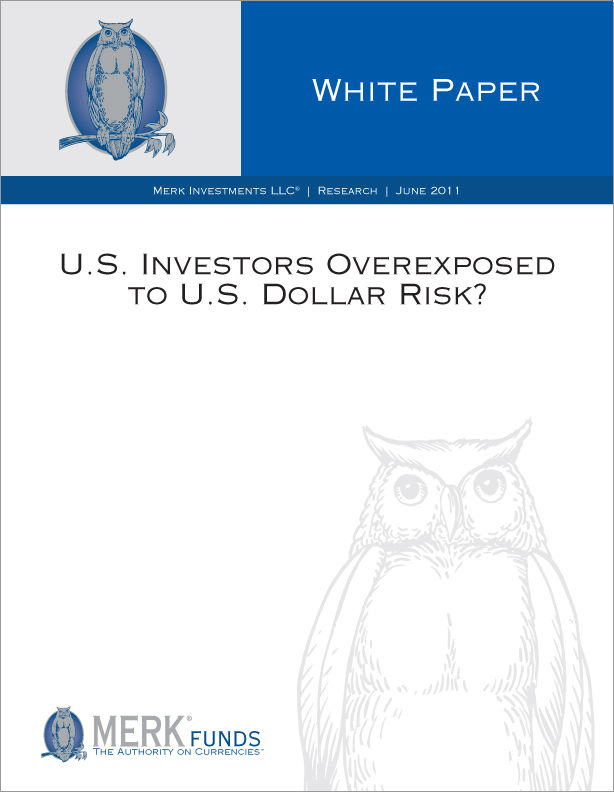 |
U.S. Investors Overexposed to U.S. Dollar Risk?
"The U.S. dollar has experienced significant weakness over recent years. We believe there are many factors that have contributed to this weakness, and in our opinion many of these factors have yet to fully play out, meaning there is a risk the U.S. dollar experiences ongoing deterioration for an extended period of time. U.S. investors may want to take this possibility into consideration when assessing the U.S. dollar risk inherent in their investment portfolios..." |
|
|
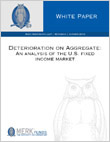 |
Deterioration on Aggregate - An Analysis of the U.S. Fixed Income Market
"Given the current environment, investors may want to take a close, hard look at the risks associated with the fixed income component of their portfolios. Recent evidence suggests that, on aggregate, the underlying fundamentals of fixed income investments throughout the economy have become riskier. The average duration of fixed income investments has increased substantially, while investor demand for lower quality securities appears to have increased..." |
|
|
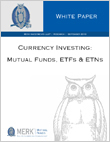 |
Currency Investing - Mutual Funds, ETFs & ETNs
"At $4.0 trillion in average daily turnover, the global currency market dwarfs the U.S. bond and equity markets. The first currency ETF was launched in 2005 and the first ETN was launched in 2007. Since then, we have witnessed rapid growth in the number of currency investment vehicles available: as of June 30, 2010, there were a combined total of 43 listed currency investment vehicles (14 currency mutual funds; 19 currency ETFs; 10 currency ETNs)..." |
|
|
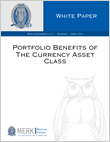 |
Portfolio Benefits of The Currency Asset Class
"In an environment with increased correlations across most asset classes, portfolio diversification is of the upmost importance. The currency asset class may be attractive in this respect, as it exhibits very low correlations to many asset classes. Moreover, the unique attributes of the currency asset class may lead to inherent inefficiencies and profit opportunities. As such, currencies may provide investors with valuable portfolio diversification benefits, possibly providing superior risk/return characteristics to an overall portfolio..." |
|
|
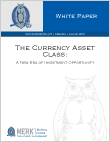 |
The Currency Asset Class - A New Era of Investment Opportunity
"Diversification has always been an important aspect of investing, and is an issue that has gained greater importance in light of recent market turmoil. When traditional asset classes move in the same direction simultaneously, investors have limited options in protecting against the downside. The currency asset class may meet this objective..." |
|
|